Burt A. The Evolution of the British Empire and Commonwealth From the American Revolution
Подождите немного. Документ загружается.

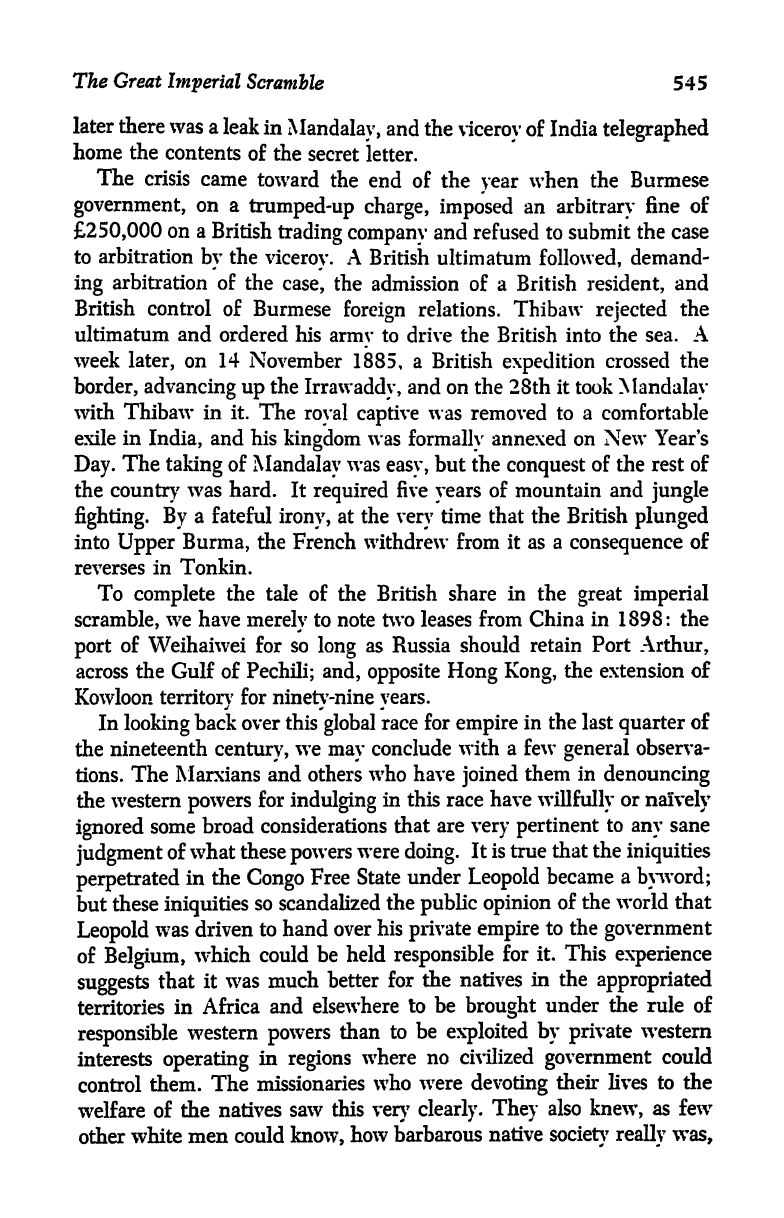
The
Great
Imperial
Scramble
545
later
there
was
a
leak
in
Mandalay,
and the
viceroy
of
India
telegraphed
home the
contents
of
the
secret
letter.
The
crisis
came
toward
the
end of the
year
when the
Burmese
government,
on
a
trumped-up
charge,
imposed
an
arbitrary
fine of
250,000
on a
British
trading
company
and refused to
submit
the
case
to
arbitration
by
the
viceroy.
A
British
ultimatum
followed,
demand-
ing
arbitration of
the
case,
the
admission of
a
British
resident,
and
British control
of
Burmese
foreign
relations.
Thibaw
rejected
the
ultimatum and ordered his
army
to drive the British into
the
sea.
A
week
later,
on
14
November
1885,
a
British
expedition
crossed
the
border,
advancing
up
the
Irrawaddy,
and
on the 28th it took
Mandalay
with
Thibaw in it.
The
royal
captive
was removed
to
a
comfortable
exile
in
India,
and his
kingdom
was
formally
annexed on
New Year's
Day.
The
taking
of
Mandalay
was
easy,
but
the
conquest
of the
rest of
the
country'
was hard.
It
required
five
years
of mountain
and
jungle
fighting.
By
a
fateful
irony,
at
the
very
time that the
British
plunged
into
Upper
Burma,
the French
withdrew from
it
as
a
consequence
of
reverses
in
Tonkin.
To
complete
the tale
of the British
share
in the
great
imperial
scramble,
we have
merely
to
note two leases from
China
in 1898: the
port
of
Weihaiwei for
so
long
as Russia should
retain Port
Arthur,
across
the
Gulf
of
Pechili;
and,
opposite Hong
Kong,
the
extension
of
Kowloon
territory
for
ninety-nine
years.
In
looking
back over this
global
race
for
empire
in
the
last
quarter
of
the
nineteenth
century,
we
may
conclude
with
a
few
general
observa-
tions.
The Marxians and
others who
have
joined
them in
denouncing
the
western
powers
for
indulging
in this race
have
willfully
or
naively
ignored
some
broad
considerations that
are
very pertinent
to
any
sane
judgment
of
what
these
powers
were
doing.
It is
true
that the
iniquities
perpetrated
in
the
Congo
Free
State
under
Leopold
became
a
byword;
but
these
iniquities
so scandalized
the
public
opinion
of
the world
that
Leopold
was driven
to
hand
over
his
private
empire
to the
government
of
Belgium,
which
could be
held
responsible
for it.
This
experience
suggests
that
it
was much better
for
the natives
in
the
appropriated
territories
in Africa
and
elsewhere
to
be
brought
under the rule
of
responsible
western
powers
than
to
be
exploited
by
private
western
interests
operating
in
regions
where
no civilized
government
could
control
them. The
missionaries
who
were
devoting
their
lives
to the
welfare
of
the natives
saw
this
very
clearly.
They
also
knew,
as
few
other
white men
could
know,
how
barbarous
native
society
really
was,
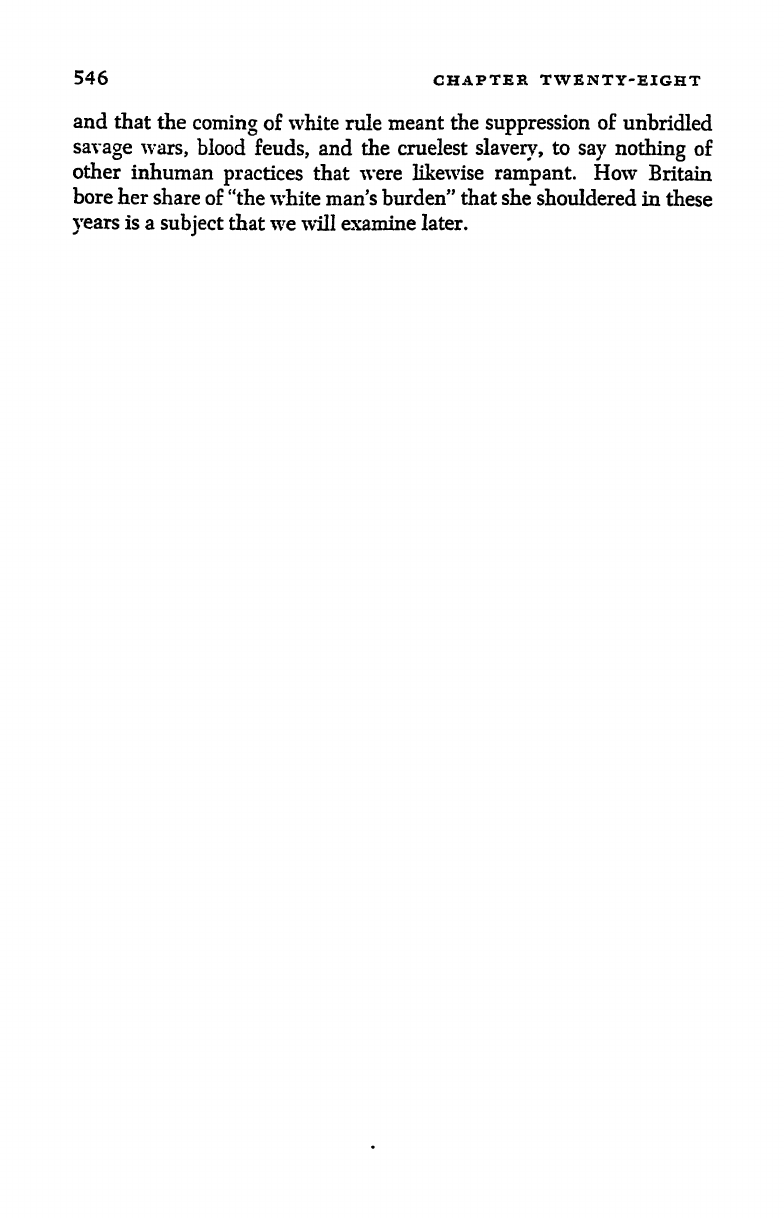
546
CHAPTER
TWENTY-EIGHT
and
that the
coming
of
white
rule
meant
the
suppression
of
unbridled
savage
wars,
blood
feuds,
and
the cruelest
slavery,
to
say
nothing
of
other
inhuman
practices
that were likewise
rampant.
How
Britain
bore
her
share
of
"the white man's burden"
that
she
shouldered
in
these
years
is
a
subject
that we
will
examine later.
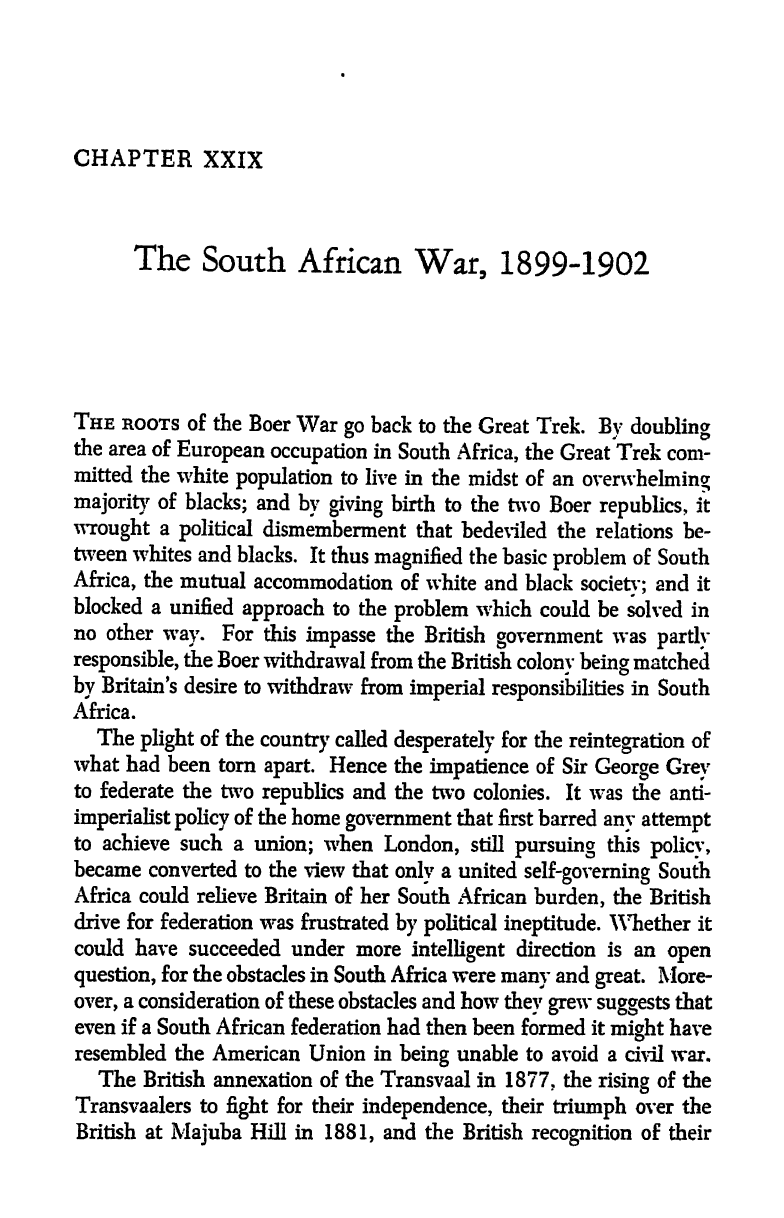
CHAPTER
XXIX
The
South
African
War,
1899-1902
THE
ROOTS
of
the
Boer
War
go
back
to the
Great Trek.
By
doubling
the
area
of
European
occupation
in
South
Africa,
the
Great Trek
com-
mitted the
white
population
to
live
in
the
midst
of an
overwhelming
majority
of
blacks;
and
by
giving
birth
to the two
Boer
republics,
it
wrought
a
political
dismemberment
that
bedeviled the
relations be-
tween
whites
and
blacks.
It
thus
magnified
the
basic
problem
of
South
Africa,
the
mutual
accommodation of
white and
black
society;
and it
blocked a
unified
approach
to the
problem
which
could be
solved in
no other
way.
For
this
impasse
the British
government
was
partly
responsible,
the
Boer
withdrawal from
the British
colony
being
matched
by
Britain's
desire
to withdraw
from
imperial responsibilities
in
South
Africa.
The
plight
of the
country
called
desperately
for
the
reintegration
of
what
had
been
torn
apart.
Hence the
impatience
of Sir
George Grey
to federate
the
two
republics
and the
two
colonies. It was the anti-
imperialist policy
of
the
home
government
that
first
barred
any
attempt
to
achieve such a
union;
when
London,
still
pursuing
this
policy,
became converted
to
the view
that
only
a
united
self-governing
South
Africa
could relieve
Britain
of her
South
African
burden,
the British
drive
for
federation was
frustrated
by
political
ineptitude.
Whether
it
could have
succeeded under
more
intelligent
direction is
an
open
question,
for the
obstacles in
South
Africa
were
many
and
great.
More-
over,
a
consideration
of
these
obstacles and how
they
grew
suggests
that
even
if a South African
federation had then
been formed
it
might
have
resembled
the
American Union
in
being
unable
to avoid
a
civil war,
The British annexation
of
the
Transvaal in
1877,
the
rising
of
the
Transvaalers
to
fight
for
their
independence,
their
triumph
over the
British at
Majuba
Hill in
1881,
and
the British
recognition
of
their
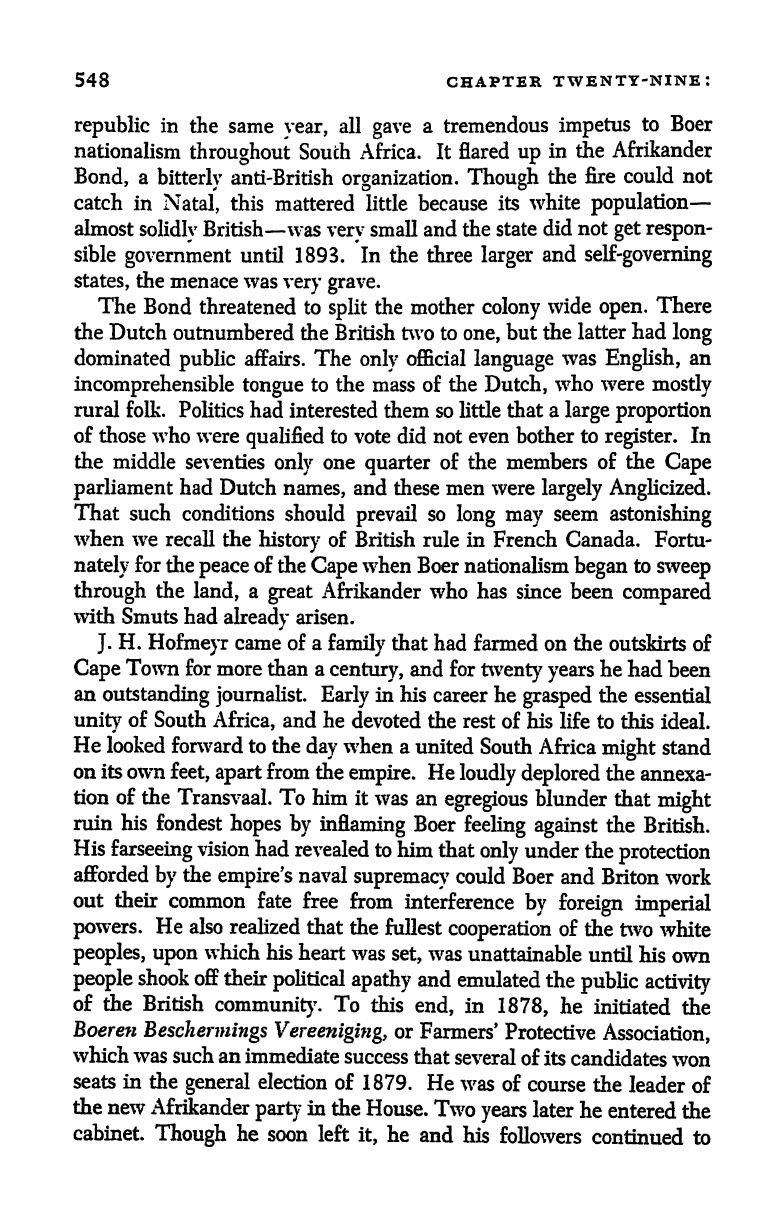
548
CHAPTER
TWENTY-NINE:
republic
in
the same
year,
all
gave
a tremendous
impetus
to Boer
nationalism
throughout
South
Africa. It
flared
up
in
the
Afrikander
Bond,
a
bitterly
anti-British
organization.
Though
the
fire
could
not
catch
in
Natal,
this
mattered little
because
its
white
population
almost
solidly
British
was
very
small
and
the
state
did
not
get
respon-
sible
government
until 1893. In the three
larger
and
self-governing
states,
the
menace was
very
grave.
The
Bond threatened
to
split
the
mother
colony
wide
open.
There
the Dutch
outnumbered the British two
to
one,
but
the
latter
had
long
dominated
public
affairs. The
only
official
language
was
English,
an
incomprehensible
tongue
to the
mass
of
the
Dutch,
who
were
mostly
rural folk.
Politics
had interested them so little
that
a
large
proportion
of those
who
were
qualified
to vote did
not
even
bother to
register.
In
the
middle
seventies
only
one
quarter
of the
members
of
the
Cape
parliament
had
Dutch
names,
and these
men
were
largely
Anglicized.
That
such
conditions
should
prevail
so
long
may
seem
astonishing
when
we
recall the
history
of
British
rule
in French Canada.
Fortu-
nately
for
the
peace
of
the
Cape
when
Boer nationalism
began
to
sweep
through
the
land,
a
great
Afrikander
who has since been
compared
with
Smuts
had
already
arisen.
J.
H.
Hofmeyr
came
of a
family
that
had
farmed
on the
outskirts
of
Cape
Town
for
more
than
a
century,
and
for
twenty years
he
had been
an
outstanding
journalist.
Early
in
his
career he
grasped
the
essential
unity
of
South
Africa,
and
he
devoted the rest
of his
life to this
ideal.
He
looked
forward
to
the
day
when a
united South
Africa
might
stand
on
its own
feet,
apart
from
the
empire.
He
loudly
deplored
the
annexa-
tion of
the
Transvaal.
To him it
was an
egregious
blunder that
might
ruin his
fondest
hopes by
inflaming
Boer
feeling
against
the
British.
His f
arseeing
vision
had
revealed
to
him that
only
under the
protection
afforded
by
the
empire's
naval
supremacy
could Boer
and Briton
work
out
their
common
fate
free
from
interference
by
foreign
imperial
powers.
He
also realized
that
the
fullest
cooperation
of
the
two
white
peoples,
upon
which his
heart
was
set,
was
unattainable
until
his
own
people
shook off their
political
apathy
and
emulated
the
public
activity
of the British
community.
To
this
end,
in
1878,
he
initiated the
Boeren
Beschermings
Vereeniging,
or
Fanners'
Protective
Association,
which
was such an
immediate
success
that
several
of its
candidates won
seats in the
general
election
of
1879.
He
was
of
course
the
leader
of
the
new
Afrikander
party
in
the
House.
Two
years
later
he
entered
the
cabinet.
Though
he soon
left
it,
he
and
his
followers
continued to
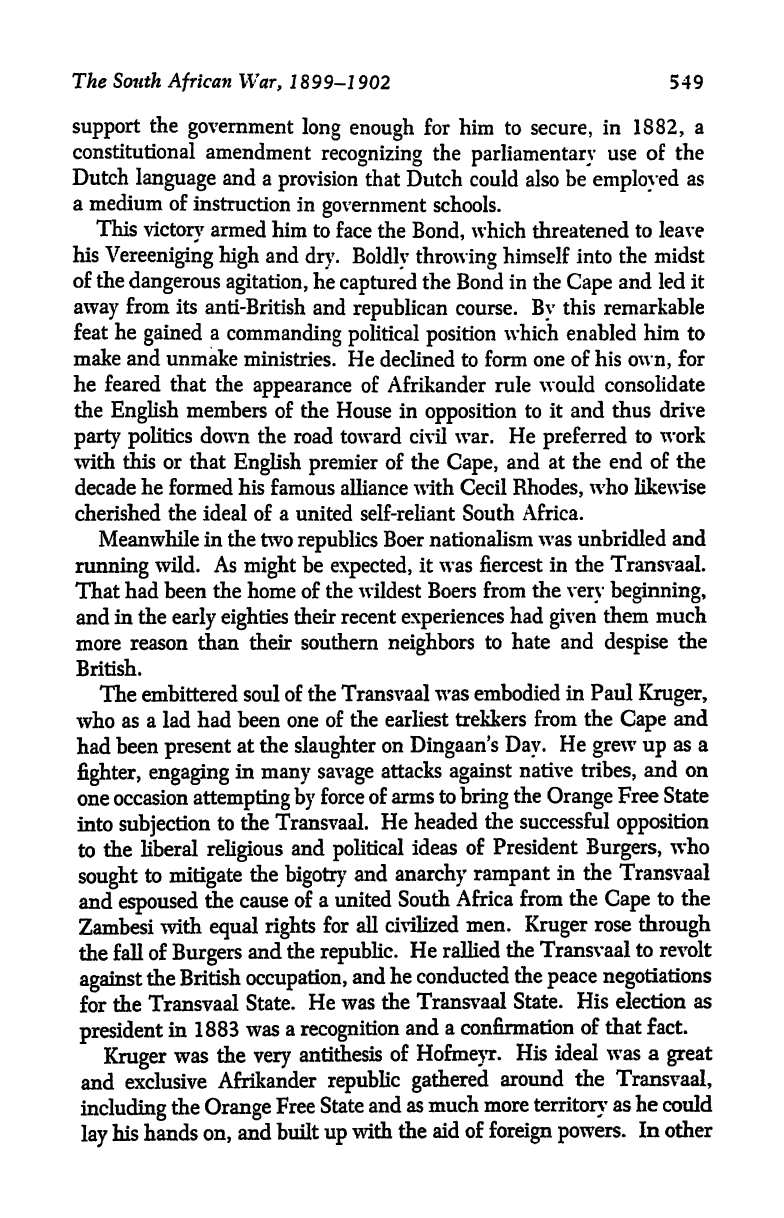
The
South
African
War,
1
899-1 902 549
support
the
government
long
enough
for
him
to
secure,
in
1882,
a
constitutional
amendment
recognizing
the
parliamentary
use
of
the
Dutch
language
and a
provision
that
Dutch could also
be
employed
as
a
medium
of
instruction
in
government
schools.
This
victory
armed him
to
face
the
Bond,
which
threatened
to
leave
his
Vereeniging
high
and
dry.
Boldly throwing
himself into
the midst
of
the
dangerous
agitation,
he
captured
the
Bond
in the
Cape
and
led it
away
from
its
anti-British
and
republican
course.
By
this remarkable
feat
he
gained
a
commanding
political
position
which enabled
him
to
make and
unmake
ministries. He
declined to
form
one of his
own,
for
he
feared that the
appearance
of
Afrikander rule would
consolidate
the
English
members
of the House in
opposition
to
it
and
thus
drive
party
politics
down
the
road toward civil
war.
He
preferred
to
work
with
this
or that
English
premier
of the
Cape,
and
at the end
of the
decade
he
formed
his
famous
alliance
with Cecil
Rhodes,
who
likewise
cherished
the
ideal of
a
united self-reliant South
Africa.
Meanwhile
in the
two
republics
Boer nationalism
was unbridled
and
running
wild. As
might
be
expected,
it
was
fiercest in the
Transvaal.
That
had been
the home
of
the wildest Boers
from
the
very
beginning,
and in
the
early
eighties
their
recent
experiences
had
given
them much
more
reason
than their southern
neighbors
to
hate and
despise
the
British.
The
embittered
soul
of
the Transvaal
was
embodied
in Paul
Kruger,
who
as
a lad
had been one
of the
earliest
trekkers from
the
Cape
and
had
been
present
at the
slaughter
on
Dingaan's
Day.
He
grew
up
as a
fighter,
engaging
in
many
savage
attacks
against
native
tribes,
and
on
one
occasion
attempting
by
force
of
arms
to
bring
the
Orange
Free
State
into
subjection
to
die
Transvaal.
He
headed
the successful
opposition
to
the
liberal
religious
and
political
ideas
of
President
Burgers,
who
sought
to
mitigate
the
bigotry
and
anarchy
rampant
in the
Transvaal
and
espoused
the
cause
of
a united
South
Africa
from
the
Cape
to
the
Zambesi
with
equal
rights
for
all
civilized
men.
Kruger
rose
through
the fall
of
Burgers
and
the
republic.
He rallied
the Transvaal
to revolt
against
the British
occupation,
and
he conducted
the
peace
negotiations
for
the
Transvaal
State.
He
was
the
Transvaal
State.
His
election
as
president
in 1883
was
a
recognition
and
a
confirmation
of that fact.
Kruger
was
the
very
antithesis
of
Hofmeyr.
His ideal
was
a
great
and
exclusive
Afrikander
republic
gathered
around
the
Transvaal,
including
the
Orange
Free
State
and
as much
more
territory
as he
could
lay
his
hands
on,
and built
up
with
the
aid of
foreign
powers.
In other
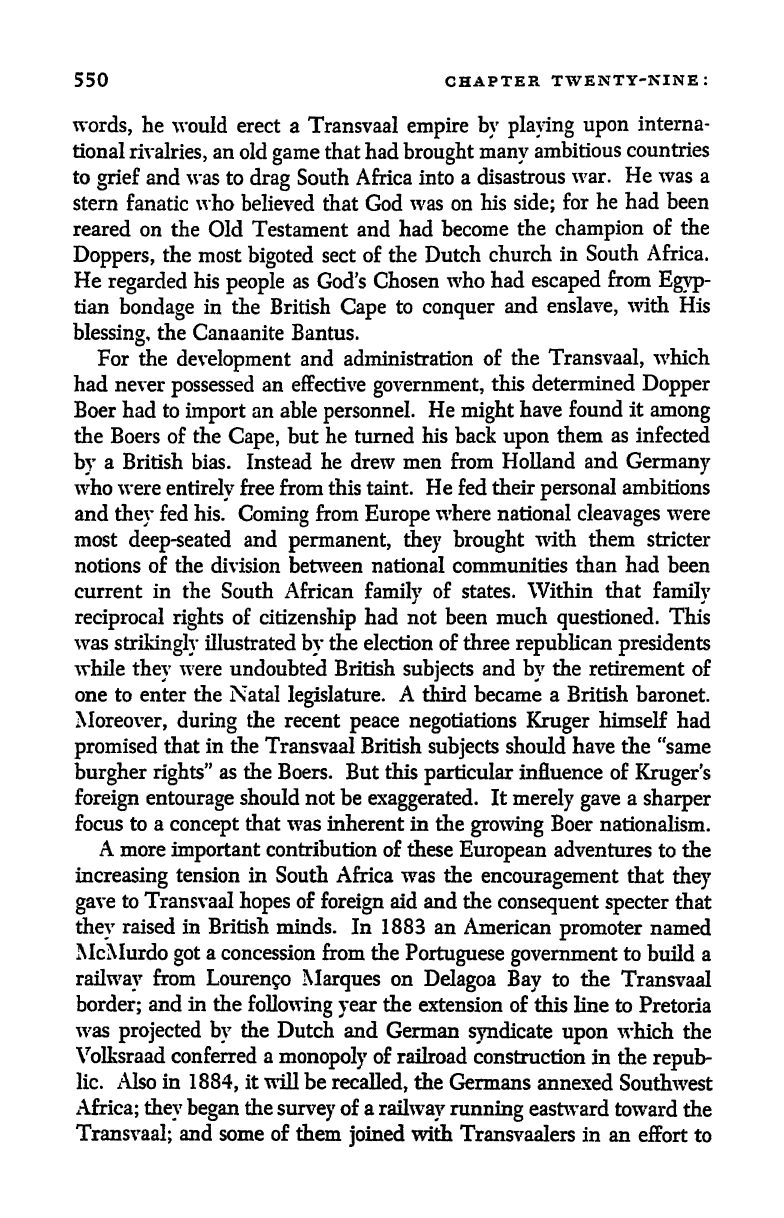
550 CHAPTER
TWENTY-NINE:
words,
he would erect
a Transvaal
empire
by
playing
upon
interna-
tional
rivalries,
an
old
game
that had
brought
many
ambitious
countries
to
grief
and was to
drag
South Africa
into
a
disastrous
war.
He
was
a
stern
fanatic
who
believed that God
was
on
his
side;
for
he
had
been
reared on the
Old
Testament and
had
become
the
champion
of the
Doppers,
the
most
bigoted
sect
of the Dutch
church
in South
Africa.
He
regarded
his
people
as
God's
Chosen
who
had
escaped
from
Egyp-
tian
bondage
in the British
Cape
to
conquer
and
enslave,
with
His
blessing,
the
Canaanite Bantus.
For
the
development
and
administration
of
the
Transvaal,
which
had never
possessed
an effective
government,
this
determined
Dopper
Boer had to
import
an able
personnel.
He
might
have found
it
among
the
Boers of the
Cape,
but
he
turned his back
upon
them
as
infected
by
a British
bias. Instead
he drew
men from Holland
and
Germany
who were
entirely
free from this
taint.
He
fed
their
personal
ambitions
and
they
fed
his.
Coming
from
Europe
where national
cleavages
were
most
deep-seated
and
permanent, they brought
with
them
stricter
notions of the
division between
national communities
than
had been
current
in
the
South African
family
of
states.
Within that
family
reciprocal
rights
of
citizenship
had
not
been much
questioned.
This
was
strikingly
illustrated
by
the
election of
three
republican
presidents
while
they
were undoubted British
subjects
and
by
the
retirement
of
one
to
enter
the Natal
legislature.
A
third
became
a
British baronet.
Moreover,
during
the recent
peace
negotiations
Kruger
himself had
promised
that in the
Transvaal British
subjects
should
have the "same
burgher
rights"
as the
Boers. But this
particular
influence
of
Kruger's
foreign
entourage
should
not
be
exaggerated.
It
merely
gave
a
sharper
focus to
a
concept
that
was inherent in
the
growing
Boer
nationalism.
A
more
important
contribution of these
European
adventures to the
increasing
tension
in
South Africa was the
encouragement
that
they
gave
to
Transvaal
hopes
of
foreign
aid and the
consequent
specter
that
they
raised in British
minds. In 1883 an
American
promoter
named
McMurdo
got
a
concession from the
Portuguese
government
to
build
a
railway
from
Louren?o
Marques
on
Delagoa Bay
to the
Transvaal
border;
and
in
the
following
year
the
extension of
this line
to
Pretoria
was
projected by
the
Dutch and
German
syndicate
upon
which
the
Volksraad conferred
a
monopoly
of railroad
construction
in the
repub-
lic.
Also in
1884,
it
will be
recalled,
the
Germans
annexed Southwest
Africa;
they
began
the
survey
of a
railway
running
eastward
toward the
Transvaal;
and
some
of
them
joined
with
Transvaalers in an
effort to
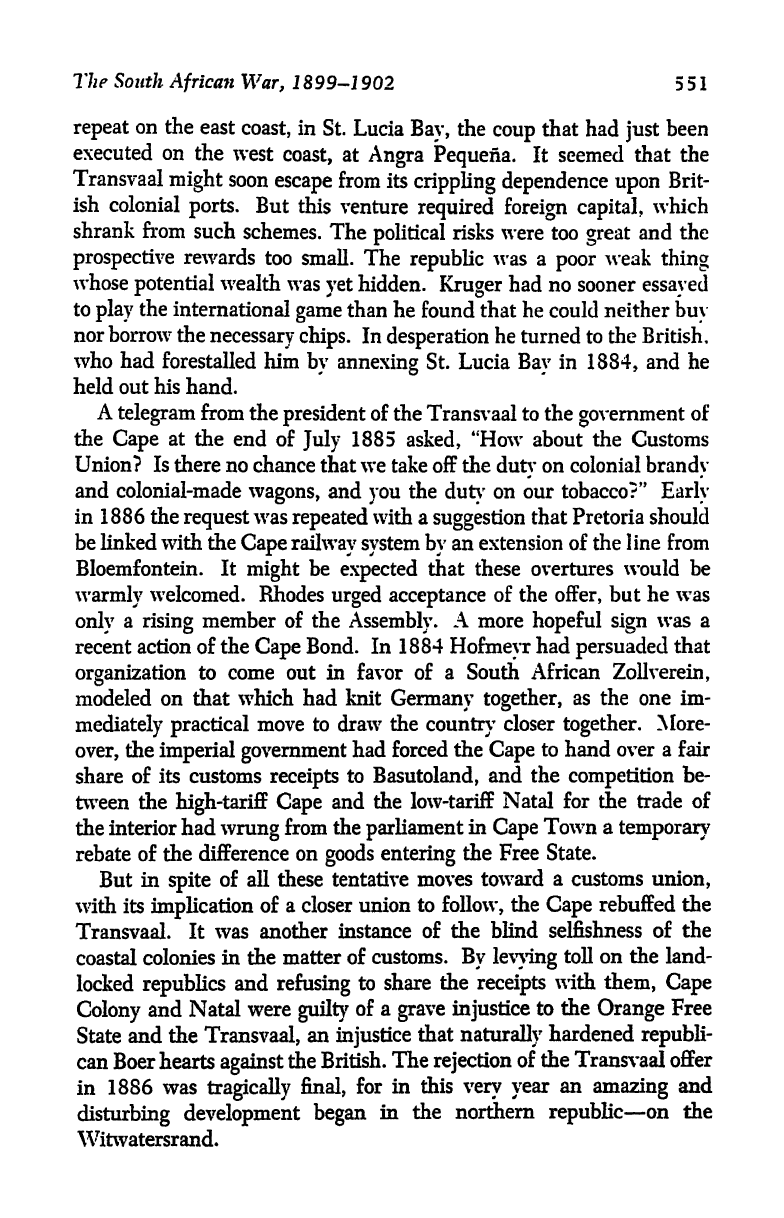
The
South
African War,
1
8
99-1
902
551
repeat
on
the
east
coast,
in
St.
Lucia
Bay,
the
coup
that
had
just
been
executed on
the
west
coast,
at
Angra
Pequena.
It seemed
that the
Transvaal
might
soon
escape
from
its
crippling dependence
upon
Brit-
ish
colonial
ports.
But
this
venture
required
foreign
capital,
which
shrank
from
such
schemes.
The
political
risks were
too
great
and the
prospective
rewards
too small.
The
republic
was a
poor
weak
thing
whose
potential
wealth
was
yet
hidden.
Kruger
had no sooner
essayed
to
play
the
international
game
than
he
found that he could
neither
buy
nor
borrow
the
necessary
chips.
In
desperation
he turned
to
the
British,
who
had
forestalled him
by
annexing
St. Lucia
Bay
in
1884,
and
he
held out
his
hand.
A
telegram
from
the
president
of the Transvaal to
the
government
of
the
Cape
at
the
end of
July
1885
asked,
"How about
the
Customs
Union?
Is
there no
chance that we
take off
the
duty
on
colonial
brandy
and
colonial-made
wagons,
and
you
the
duty
on
our tobacco?"
Early
in 1886 the
request
was
repeated
with a
suggestion
that
Pretoria should
be linked with the
Cape
railway system by
an extension of
the
line from
Bloemfontein.
It
might
be
expected
that these overtures would
be
warmly
welcomed.
Rhodes
urged acceptance
of the
offer,
but he was
only
a
rising
member of the
Assembly.
A
more
hopeful sign
was
a
recent action of
the
Cape
Bond. In
1884
Hofmeyr
had
persuaded
that
organization
to
come out in
favor
of
a
South African
Zollverein,
modeled
on that which had
knit
Germany together,
as
the
one
im-
mediately practical
move to
draw
the
country
closer
together.
More-
over,
the
imperial
government
had forced
the
Cape
to hand
over a
fair
share
of
its customs
receipts
to
Basutoland,
and
the
competition
be-
tween
the
high-tariff
Cape
and the
low-tariff
Natal
for the
trade
of
the
interior had
wrung
from the
parliament
in
Cape
Town
a
temporary
rebate
of
the
difference on
goods
entering
the Free State.
But
in
spite
of all
these tentative
moves toward
a
customs
union,
with
its
implication
of
a
closer
union
to
follow,
the
Cape
rebuffed
the
Transvaal.
It was another
instance
of the blind
selfishness of
the
coastal
colonies
in
the
matter
of
customs.
By
levying
toll
on the land-
locked
republics
and
refusing
to
share
the
receipts
with
them,
Cape
Colony
and Natal
were
guilty
of
a
grave
injustice
to
the
Orange
Free
State
and the
Transvaal,
an
injustice
that
naturally
hardened
republi-
can Boer
hearts
against
the British.
The
rejection
of
the
Transvaal
offer
in
1886
was
tragically
final,
for
in this
very year
an
amazing
and
disturbing
development began
in the northern
republic
on
the
Witwatersrand.
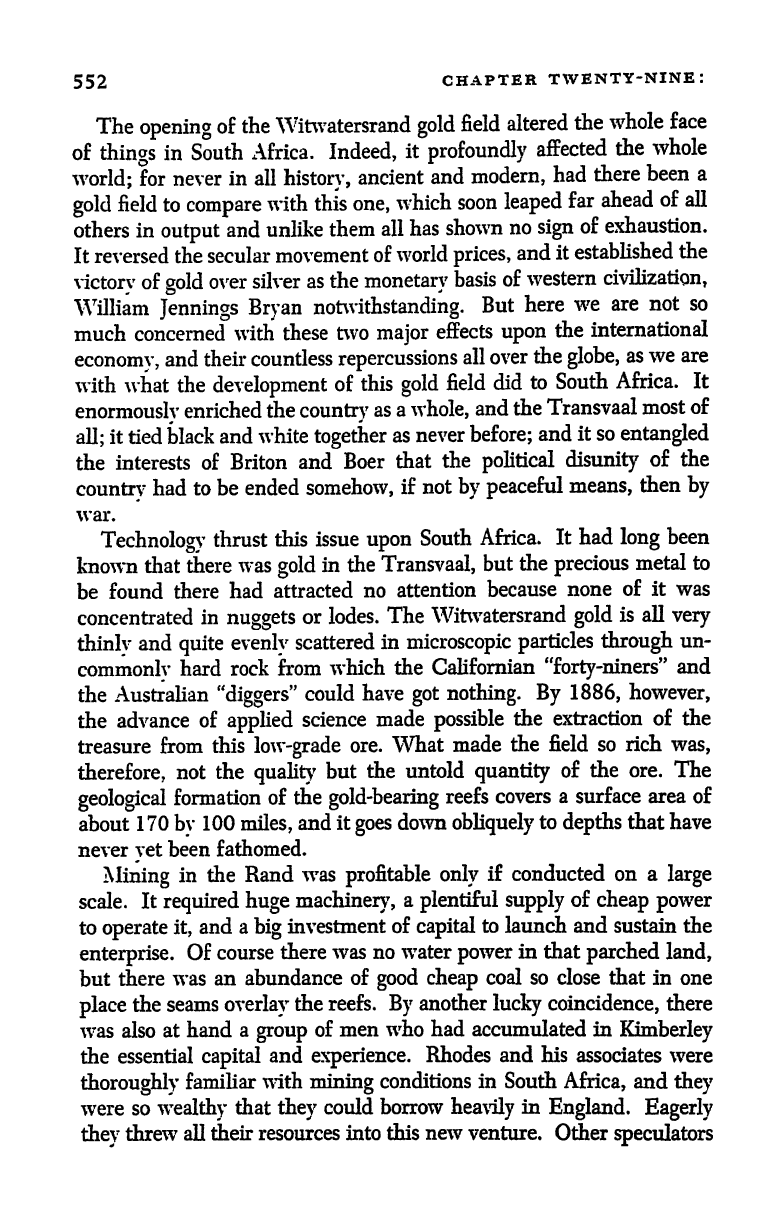
552
CHAPTER
TWENTY-NINE:
The
opening
of
the
Witwatersrand
gold
field
altered
the
whole face
of
things
in
South
Africa.
Indeed,
it
profoundly
affected
the
whole
world;
for never
in all
history,
ancient
and
modern,
had
there
been a
gold
field to
compare
with
this
one,
which
soon
leaped
far
ahead
of
all
others
in
output
and
unlike
them
all
has
shown
no
sign
of
exhaustion.
It
reversed the
secular
movement
of
world
prices,
and
it
established
the
victory
of
gold
over
silver
as the
monetary
basis
of
western
civilization,
William
Jennings
Bryan
notwithstanding.
But
here
we
are
not
so
much concerned
with
these
two
major
effects
upon
the
international
economy,
and
their countless
repercussions
all over
the
globe,
as
we are
with
what the
development
of
this
gold
field
did
to
South
Africa. It
enormously
enriched
the
country
as
a
whole,
and
the
Transvaal
most
of
all;
it
tied
black
and
white
together
as
never
before;
and
it so
entangled
the
interests
of Briton
and
Boer
that
the
political
disunity
of the
country
had
to
be
ended
somehow,
if
not
by peaceful
means,
then
by
war.
Technology
thrust
this
issue
upon
South
Africa.
It
had
long
been
known
that
there
was
gold
in the
Transvaal,
but
the
precious
metal
to
be
found
there
had
attracted
no
attention
because
none
of it was
concentrated
in
nuggets
or lodes.
The
Witwatersrand
gold
is all
very
thinly
and
quite
evenly
scattered
in
microscopic
particles through
un-
commonly
hard
rock from
which
the Californian
"forty-niners"
and
the Australian
"diggers"
could
have
got
nothing.
By
1886, however,
the
advance
of
applied
science
made
possible
the extraction of
the
treasure
from
this
low-grade
ore.
What
made
the field
so rich
was,
therefore,
not the
quality
but
the untold
quantity
of
the ore. The
geological
formation
of the
gold-bearing
reefs covers
a
surface
area
of
about
170
by
100
miles,
and
it
goes
down
obliquely
to
depths
that
have
never
yet
been
fathomed.
Mining
in
the
Rand
was
profitable
only
if conducted
on
a
large
scale.
It
required
huge
machinery,
a
plentiful
supply
of
cheap
power
to
operate
it,
and
a
big
investment
of
capital
to launch
and sustain
the
enterprise.
Of
course
there was
no water
power
in that
parched
land,
but
there
was
an
abundance
of
good
cheap
coal so close that
in one
place
the seams
overlay
the
reefs.
By
another
lucky
coincidence,
there
was also
at
hand
a
group
of
men
who
had accumulated in
Kimberley
the
essential
capital
and
experience.
Rhodes
and his
associates were
thoroughly
familiar
with
mining
conditions
in South
Africa,
and
they
were so
wealthy
that
they
could borrow
heavily
in
England.
Eagerly
they
threw
all
their resources
into this
new
venture.
Other
speculators
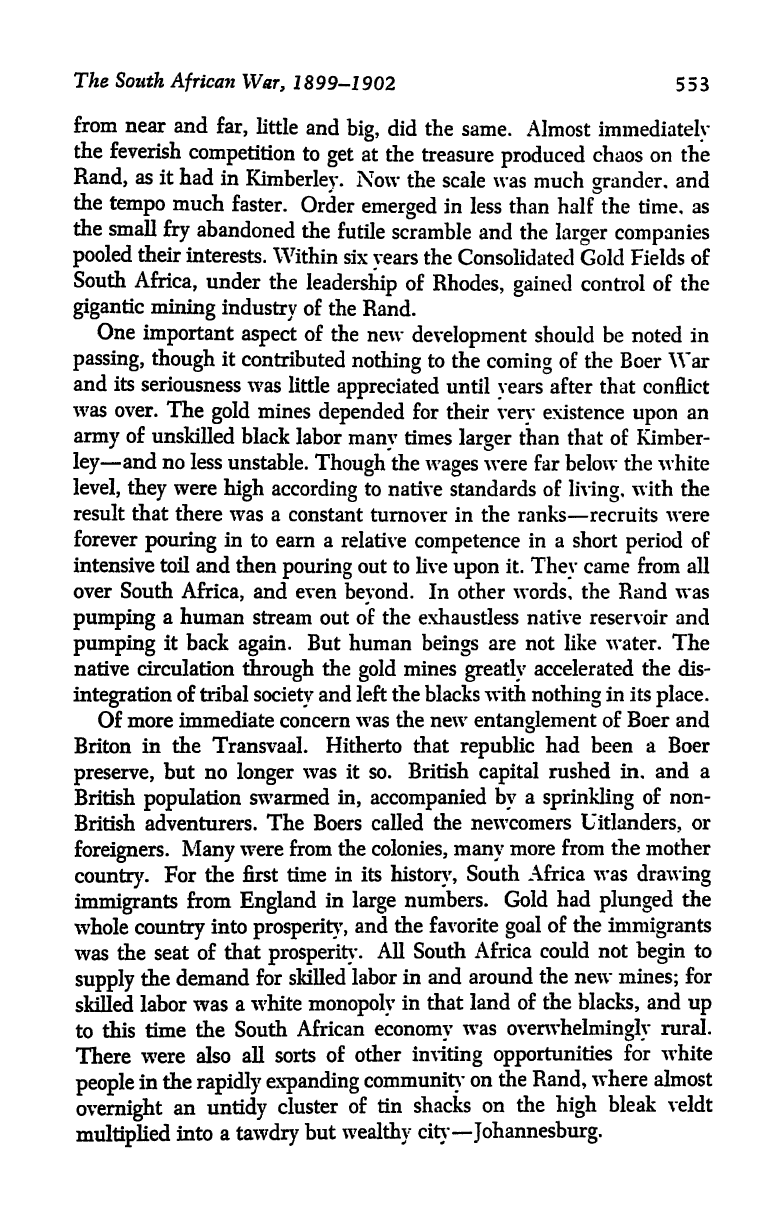
The South
African War,
1899-1 902
553
from near
and
far,
little
and
big,
did the
same.
Almost
immediately
the
feverish
competition
to
get
at
the
treasure
produced
chaos on
the
Rand,
as
it
had
in
Kimberley.
Now the
scale
was
much
grander,
and
the
tempo
much
faster.
Order
emerged
in
less than
half
the
time,
as
the
small
fry
abandoned
the
futile
scramble and
the
larger companies
pooled
their
interests.
Within
six
years
the
Consolidated
Gold Fields
of
South
Africa,
under
the
leadership
of
Rhodes,
gained
control of
the
gigantic
mining
industry
of
the
Rand.
One
important
aspect
of
the
new
development
should
be noted
in
passing,
though
it
contributed
nothing
to
the
coming
of the Boer War
and its
seriousness
was
little
appreciated
until
years
after that
conflict
was over.
The
gold
mines
depended
for
their
very
existence
upon
an
army
of
unskilled
black
labor
many
times
larger
than
that
of
Kimber-
ley
and
no less
unstable.
Though
the
wages
were far below the white
level,
they
were
high
according
to native standards
of
living,
with the
result
that
there
was
a
constant
turnover
in the ranks
recruits
were
forever
pouring
in to
earn
a
relative
competence
in
a
short
period
of
intensive
toil
and then
pouring
out to
live
upon
it.
They
came
from
all
over
South
Africa,
and even
beyond.
In other
words,
the Rand was
pumping
a
human
stream
out
of
the
exhaustless
native reservoir
and
pumping
it
back
again.
But human
beings
are
not
like
water. The
native circulation
through
the
gold
mines
greatly
accelerated the dis-
integration
of tribal
society
and left
the
blacks
with
nothing
in its
place.
Of
more
immediate
concern
was the
new
entanglement
of
Boer
and
Briton
in
the
Transvaal.
Hitherto that
republic
had
been
a
Boer
preserve,
but no
longer
was it so.
British
capital
rushed
in,
and
a
British
population
swarmed
in,
accompanied
by
a
sprinkling
of
non-
British
adventurers.
The Boers called
the
newcomers
Uitlanders,
or
foreigners.
Many
were from
the
colonies,
many
more
from the mother
country.
For
the first
time
in its
history,
South Africa was
drawing
immigrants
from
England
in
large
numbers. Gold
had
plunged
the
whole
country
into
prosperity,
and
the favorite
goal
of
the
immigrants
was
the seat
of
that
prosperity.
All
South
Africa could
not
begin
to
supply
the
demand
for
skilled
labor
in and
around
the new
mines;
for
skilled
labor
was
a white
monopoly
in
that land of
the
blacks,
and
up
to
this
time
the South
African
economy
was
overwhelmingly
rural.
There
were also
all
sorts
of
other
inviting
opportunities
for
white
people
in the
rapidly
expanding
community
on
the
Rand,
where
almost
overnight
an
untidy
cluster
of
tin shacks
on
the
high
bleak veldt
multiplied
into
a
tawdry
but
wealthy
city
Johannesburg.
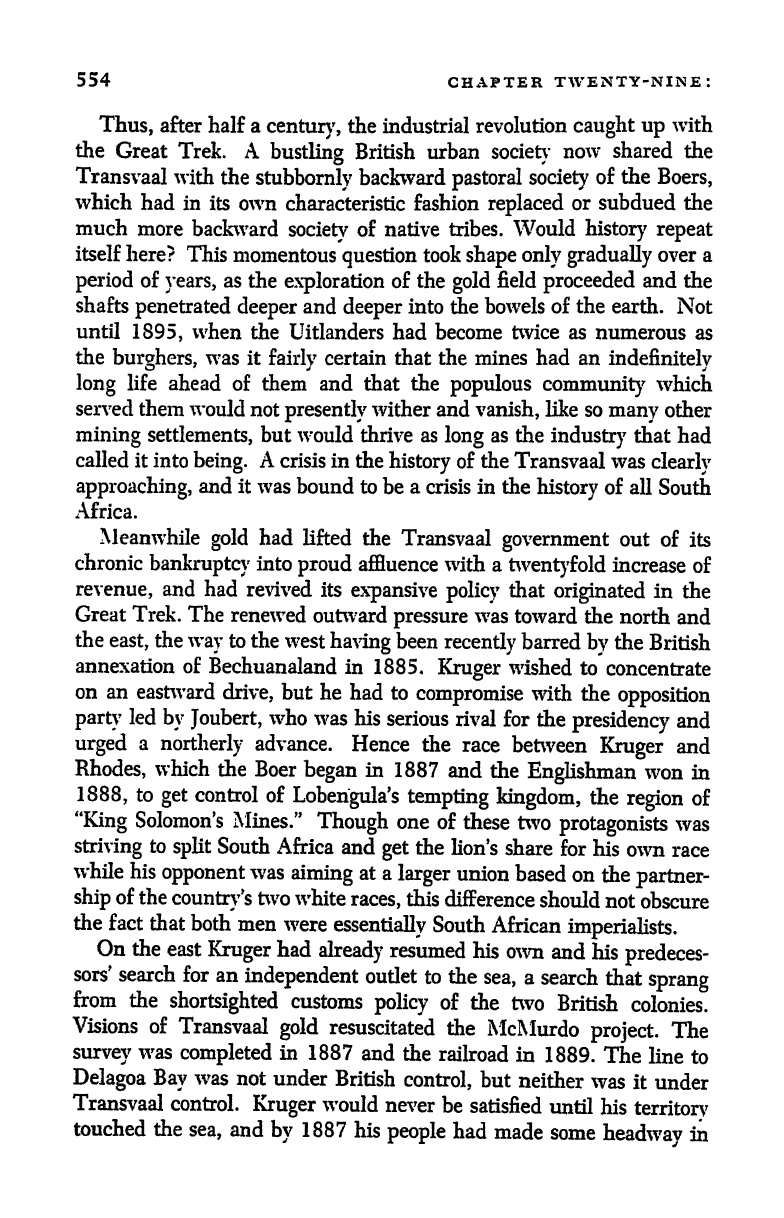
554
CHAPTER
TWENTY-NINE:
Thus,
after
half
a
century,
the
industrial
revolution
caught
up
with
the
Great
Trek. A
bustling
British
urban
society
now
shared
the
Transvaal with the
stubbornly
backward
pastoral
society
of
the
Boers,
which
had in
its
own
characteristic fashion
replaced
or subdued
the
much
more
backward
society
of native
tribes.
Would
history
repeat
itself
here?
This
momentous
question
took
shape
only
gradually
over a
period
of
years,
as
the
exploration
of the
gold
field
proceeded
and
the
shafts
penetrated
deeper
and
deeper
into
the
bowels
of
the
earth.
Not
until
1895,
when
the Uitlanders
had
become
twice as
numerous
as
the
burghers,
was it
fairly
certain that
the
mines
had an
indefinitely
long
life
ahead of them and that the
populous
community
which
served
them
would
not
presently
wither and
vanish,
like so
many
other
mining
settlements,
but would thrive as
long
as the
industry
that
had
called
it
into
being.
A
crisis in the
history
of
the
Transvaal
was
clearly
approaching,
and it was bound
to
be
a
crisis in the
history
of
all
South
Africa.
Meanwhile
gold
had
lifted the
Transvaal
government
out
of
its
chronic
bankruptcy
into
proud
affluence with a
twentyfold
increase of
revenue,
and had
revived its
expansive
policy
that
originated
in
the
Great Trek.
The
renewed
outward
pressure
was
toward the
north
and
the
east,
the
way
to
the
west
having
been
recently
barred
by
the
British
annexation
of
Bechuanaland in
1885,
Kruger
wished
to
concentrate
on
an
eastward
drive,
but
he
had to
compromise
with
the
opposition
party
led
by
Joubert,
who
was his
serious
rival
for the
presidency
and
urged
a
northerly
advance.
Hence
the
race
between
Kruger
and
Rhodes,
which
the
Boer
began
in
1887
and the
Englishman
won
in
1888,
to
get
control
of
Lobengula's
tempting
kingdom,
the
region
of
"King
Solomon's
Mines."
Though
one of
these
two
protagonists
was
striving
to
split
South
Africa
and
get
the
lion's
share
for
his
own
race
while
his
opponent
was
aiming
at
a
larger
union
based on
the
partner-
ship
of the
country's
two white
races,
this
difference
should
not
obscure
the
fact
that
both
men
were
essentially
South
African
imperialists,
On
the east
Kruger
had
already
resumed
his
own
and
his
predeces-
sors' search for
an
independent
outlet
to
the
sea,
a
search
that
sprang
from the
shortsighted
customs
policy
of
the
two
British
colonies.
Visions
of
Transvaal
gold
resuscitated the
McMurdo
project.
The
survey
was
completed
in
1887
and
the
railroad in
1889.
The
line
to
Delagoa
Bay
was
not
under
British
control,
but
neither
was
it
under
Transvaal
control.
Kruger
would
never
be
satisfied
until
his
territory
touched
the
sea,
and
by
1887
his
people
had
made
some
headway
in
